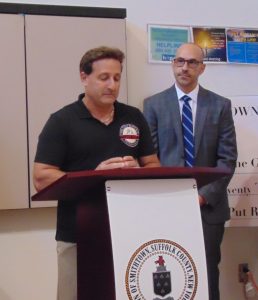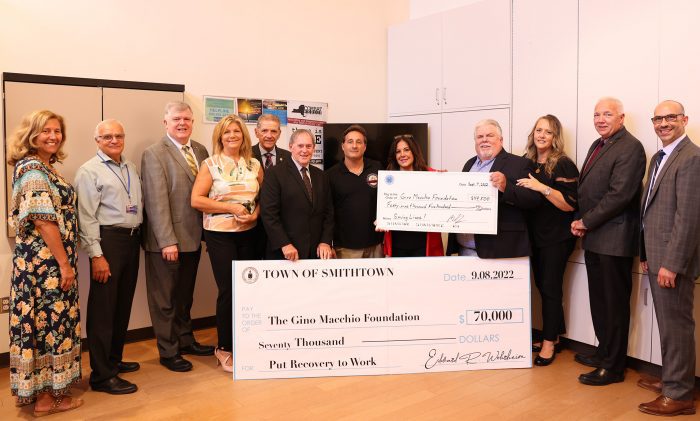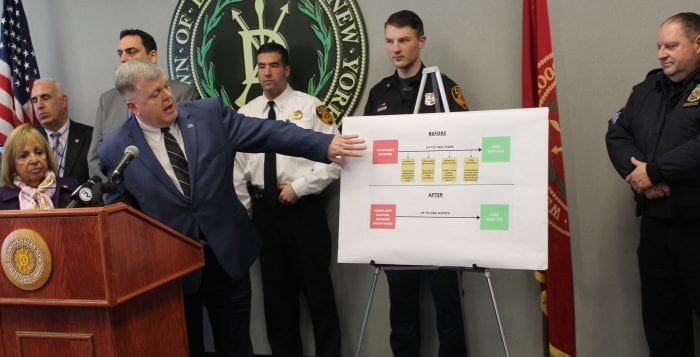Elected officials from Smithtown and Babylon gathered at the Horizons Counseling and Education Center on Main Street Sept. 8 to give people who have battled addictions successfully a second chance.

Smithtown Supervisor Ed Wehrheim (R) announced the town was donating $70,000 to the Gino Macchio Foundation from Smithtown’s American Rescue Plan Act funds. At the gathering, Babylon Supervisor Rich Schaffer (D) said his town likewise was donating $49,500 from ARPA funds.
Deborah and Steven Macchio, who lost their son Gino due to injuries sustained in a motorcycle crash in 2018, were on hand for the announcement. The foundation’s executive director Kenneth Daly also attended with the Macchios.
Gino Macchio, who had recovered from a prescription opioid addiction, was 25 when he died. Before his death, he was committed to helping the oyster industry obtain sustainability and cleaning up the Great South Bay. His parents are on the board of the foundation.
The money donated on Sept. 8 will go toward the nonprofit’s Put Recovery to Work scholarship program, which provides recovery addicts employment opportunities. The Town of Babylon has already committed space at the Beacon Family Wellness Center in North Babylon to the program. A second location for the center, to be built in Amityville, will include the foundation’s job placement program.
“This money will go toward giving employment opportunities to individuals recovering at our local businesses,” Wehrheim said. “ARPA funds were originally intended to go to local municipalities for the purpose of getting communities back on their feet.”
He thanked Schaffer for helping to remove the stigma associated with recovery “and for being the first to take action to foster and encourage efforts to promote recovery-friendly workplaces at a local level.”
The supervisors hope that other municipalities will follow suit.
“We are here this morning to show solidarity to encourage surrounding communities throughout the state to do the same thing that we’re doing this morning,” Wehrheim said.
Schaffer said substance abuse has increased during the pandemic.
“We saw such a dramatic increase in people who are already suffering from addiction issues, but others who acquired them as a result of what went on,” he said. “Ed was one of the first supervisors to say we’ve got to do something. He’s a great partner in a number of things and, most importantly, in this initiative which is near and dear to my heart”
The Babylon supervisor has known the Macchios for nearly 40 years and knew Gino from when he was born. He said he remembered Gino getting back on his feet after struggling with addiction.
“Little did he know that one of the biggest things he was going to be doing was having this foundation created and providing opportunities for those who are going through the same issues that he was going through,” Schaffer said.
Joe Bieniewicz, director of drug and alcohol counseling services at Horizons, said the program’s work placement initiative goes beyond finding a job for a recovering addict.
“These opportunities allow for folks who are in need to find gainful employment, build their self-esteem and continue to engage in purposeful activity once again,” he said.
Steven Macchio said purpose is important for everyone.
“What we do with our foundation, with our Put Recovery to Work program, is we want to create purpose,” Macchio said. “We want to bridge the gap from rehabilitation to getting back out into the world and starting with your life again.”






